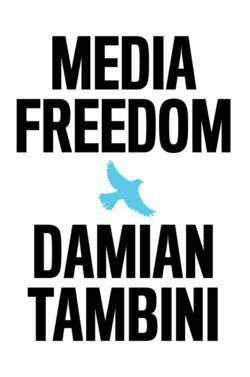Читать книгу Media Freedom - Damian Tambini - Страница 15
Is Self-Regulation Voluntary?
ОглавлениеPoliticians have always fulminated about the media. But would threats issued, for example, by a US president against the ‘fake news media’ constitute attacks on media freedom? A president surely, like any other person, has the right to express his opinion about the content of the press. At what point does comment tip over into censorship?
Even in the US, the media do not have a First Amendment right to protection from merely being criticized, only protection from genuine restrictions of speech. But the line between direct and indirect restrictions of media freedom is not entirely clear. If a government agency were to interfere in the operation of the media – by denying CNN a licence to use the airwaves, for example – a First Amendment claim might protect them. But there is a variety of other ways in which the fortunes of a CNN, or for that matter a Washington Post or even a HuffPost, are entwined with or even determined by governmental decisions. Government could implement a tax reform, a levy on paper or distribution, revoke net neutrality rules that guarantee free internet distribution, or merely shift a proportion of the government’s huge advertising budget to ‘favoured’ media. Or a government could threaten to do so. And the threat could be implicit or unstated, in the open or hidden in private communications. Because some of these policy decisions are highly technical, and their economic effects opaque, the subtle workings of the relationship among the estates of government quickly become murky. Questions of power, control and potential reciprocity are extremely difficult to resolve. In 1997, when Tony Blair became prime minster of the United Kingdom, he was widely perceived to have reached an ‘understanding’ with Rupert Murdoch that he would not use competition powers to limit the size or scope of Murdoch’s newspapers (which had supported Blair) or his satellite broadcaster.75 Some commentators argued that there was a much broader understanding or quid pro quo for Murdoch’s support: that there was an ongoing dialogue about policy between Murdoch and Blair, a view supported by evidence to the Leveson Inquiry.76
In such contexts, the question of when an ‘understanding’ about ‘responsible journalism’ shades off into government control of media can be difficult to pinpoint. In some widely accepted ways, the media are expected to regulate themselves and avoid publishing certain kinds of information. This is the realm of ‘ethical self-regulation’, and it is important that journalists themselves make the call about what kinds of information (such as facts that have not been checked) are deemed unworthy of publication. There may be multiple conflicting pressures: an editorial team may be split on the newsworthiness of the story, some may question the veracity of the sources or the validity of some of the claims of illegality. The subjects of the story may threaten legal action. Politicians may make public pronouncements denying reports, and even try to ridicule and cow the media, making accusations that it is ‘fake news’. There may be veiled, implicit or simply assumed threats that some consequences may follow in government policy: a denial of advertising revenue here, a regulatory tweak there. At any time, a management and editorial decision could be taken to reduce the resources given to this journalist, to give the story less prominence or to drop it entirely. These decisions can be taken for a variety of reasons and risk calculations, and the boundaries between an autonomous editorial decision, an act of self-censorship, and the shutting down of a story through state action can be difficult to draw. In some countries there may be a relatively open legal and regulatory system for the media, but tacit understandings that some topics are simply not for public discussion. The presence of censorship and the extent of freedom can be hidden away in unconscious decisions with multiple causes, which lie behind the ‘gut’ decisions of busy editors.
